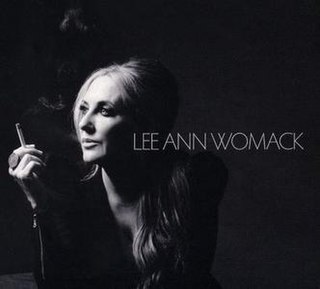
Julie Anne Miller is an American songwriter, singer, and recording artist living in Nashville, Tennessee. She married Buddy Miller in 1981. They sing and play on each other's solo projects and have recorded several duet albums.

Lee Ann Womack is an American singer and songwriter. She has charted 23 times on the American Billboard Hot Country Songs charts; her highest peaking single there is her crossover signature song, "I Hope You Dance". Five of her singles made top 10 on the country music charts of the defunct RPM magazine in Canada.

I Hope You Dance is the third studio album by American country music singer Lee Ann Womack. It was released on May 23, 2000, as her first album for MCA Nashville. The title track was a crossover hit in 2000, becoming Womack's only number one single on the Billboard Hot Country Songs chart, while "Ashes by Now", "Why They Call It Falling", and "Does My Ring Burn Your Finger" also peaked in the top 40 region of that chart.

"I Hope You Dance" is a crossover country pop song written by Mark D. Sanders and Tia Sillers and recorded by American country music singer Lee Ann Womack with Sons of the Desert. Released in March 2000, it was the first single from Womack's 2000 album, I Hope You Dance. The song reached number one on both the Billboard Hot Country Singles & Tracks and Hot Adult Contemporary Tracks charts, and also reached number fourteen on the Billboard Hot 100. It is considered to be Womack's signature song, and it is the only Billboard number one for both Womack and Sons of the Desert.

Lee Ann Womack is the debut studio album by American country music singer Lee Ann Womack. The album was certified gold by the RIAA on January 16, 1998, and platinum on September 24, 1999. Hits that appeared on the Billboard Hot Country Singles chart were "Never Again, Again" which peaked at #23, "The Fool" and "You've Got to Talk to Me" both at #2, and "Buckaroo" at #27. The album itself topped out at #9 on the Top Country Albums chart.

Some Things I Know is the second studio album by American country music artist Lee Ann Womack. It was released on September 22, 1998, and rose to the #20 position on the Billboard Top Country Albums chart. The album's first two singles, "A Little Past Little Rock" and "I'll Think of a Reason Later," both peaked at number 2 on the U.S. Billboard Hot Country Singles & Tracks chart. Additionally, "(Now You See Me) Now You Don't" reached the Top 20 on the chart. The album's fourth and final single, "Don't Tell Me," failed to reach the Top 40 on the chart.

Something Worth Leaving Behind is the fourth studio album by American country music artist Lee Ann Womack. It was released on August 20, 2002, by MCA Nashville; the UK version was co-released on Island Records.

Greatest Hits is the first compilation album by American country music artist Lee Ann Womack, released on May 4, 2004 by MCA Nashville. It was Womack's first release issued on both the DualDisc and Super Audio CD formats, both of which were issued the following year. The compilation includes eleven of Womack's previous songs, including her sole number one on the Billboard Hot Country Songs chart "I Hope You Dance" with Sons of the Desert. One of those, "Does My Ring Burn Your Finger", was re-worked for this compilation. Also included is her duet with Willie Nelson, "Mendocino County Line", which was included on Nelson's 50th studio album The Great Divide (2002), but had only been included on the UK edition of Womack's fourth studio album Something Worth Leaving Behind (2002).

American country music artist Lee Ann Womack has released nine studio albums, three compilation albums, one extended play, 30 singles, 20 music videos, and appeared on 43 albums. Womack's self-titled debut album was released in May 1997 on Decca Records. It peaked at number nine on the Billboard Top Country Albums chart and number 106 on the Billboard 200, certifying platinum from the Recording Industry Association of America. It featured the hit singles "Never Again, Again", "The Fool", and "You've Got to Talk to Me". Her gold-certifying second album Some Things I Know (1998) reached number 20 on the country albums chart, spawning the hits "A Little Past Little Rock" and "I'll Think of a Reason Later".

"I'll Think of a Reason Later" is a song by American country music artist Lee Ann Womack, released on January 4, 1999, as the second single from her sophomore studio album Some Things I Know (1998). The song was written by Tony Martin and Tim Nichols, while Mark Wright produced the song. It hit number two on the US Hot Country Songs chart behind Kenny Chesney's "How Forever Feels" while topping the Canada RPM Country Tracks and the Radio & Records country airplay charts. The song did particularly well despite lacking a music video.

Call Me Crazy is the seventh studio album by American country music singer Lee Ann Womack, released on October 21, 2008 via MCA Nashville Records. It is her first studio release in three years, as her previous album was not released. The lead-off single to this album is "Last Call" which in late 2008 became Womack's first Top 20 country hit in three years. The album's second single, "Solitary Thinkin", was released in April 2009 and reached the Top 40 of the country charts, peaking at #39 in June 2009. The album was nominated for the Grammy Award for Best Country Album on December 2, 2009.

"Last Call" is a song written by Erin Enderlin and Shane McAnally, and recorded by American country music artist Lee Ann Womack. It was released in June 2008 as the lead-off single from Womack's album Call Me Crazy, which was released in October 2008. In December the song reached number 14 on the Billboard Hot Country Songs chart, becoming Womack's first Top 20 hit in three years.

"A Little Past Little Rock" is a song written by Brett Jones, Tony Lane and Jess Brown, and recorded by American country music artist Lee Ann Womack. It was released in June 1998 as the first single from her album Some Things I Know. The song peaked at number 2 on the U.S. Billboard Hot Country Singles & Tracks chart.

"Ashes by Now" is a song written by Rodney Crowell. It has since been recorded several times by various musical artists in the country music format. The song was first recorded by Crowell himself, eventually releasing it as a single in 1980.
"(Now You See Me) Now You Don't" is a song written by Tony Lane, Jess Brown and David Lee, and recorded by American country music artist Lee Ann Womack. It was released in August 1999 as the third single from her CD Some Things I Know. The song peaked at number 12 on the Billboard Hot Country Singles & Tracks.
"Never Again, Again" is a song written by Monty Holmes and Barbie Isham, and performed by American country music singer Lee Ann Womack. It was released as Womack's debut record in March 1997 on Decca Nashville and was later included in her 1997 album Lee Ann Womack. The single began Womack's career. It peaked at number 23 on the U.S. Billboard Hot Country Singles & Tracks chart.

"Does My Ring Burn Your Finger" is a song written by husband and wife duo Julie and Buddy Miller. It was originally recorded by Buddy on his third studio album Cruel Moon, released in 1999. American country music artist Lee Ann Womack took an interest in the song and recorded her own version for her third studio album I Hope You Dance (2000). Her version features backing vocals by the Millers. The song would be officially released on October 29, 2001, as the fourth and final single from the album via MCA Nashville Records.

The Way I'm Livin' is the eighth studio album by American country music recording artist Lee Ann Womack. The album was released via Sugar Hill Records on September 23, 2014. Her first album in six years, following 2008's Call Me Crazy, this album sees Womack embrace roots music and americana alongside neotraditional country rather than the country pop sound that was prevalent in several previous releases.
"Solitary Thinkin'" is a song recorded by American country music artist Lee Ann Womack. It was released in April 2009 as the second single from the album Call Me Crazy. The song reached #39 on the Billboard Hot Country Songs chart. The song was written by Waylon Payne.

The Lonely, the Lonesome & the Gone is the ninth studio album by the American country music singer-songwriter Lee Ann Womack. It was released on October 27, 2017, by ATO Records. It was available to stream a week before on NPR.org as part of its First Listen series.
















